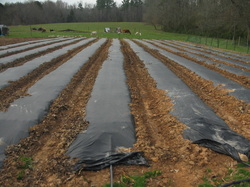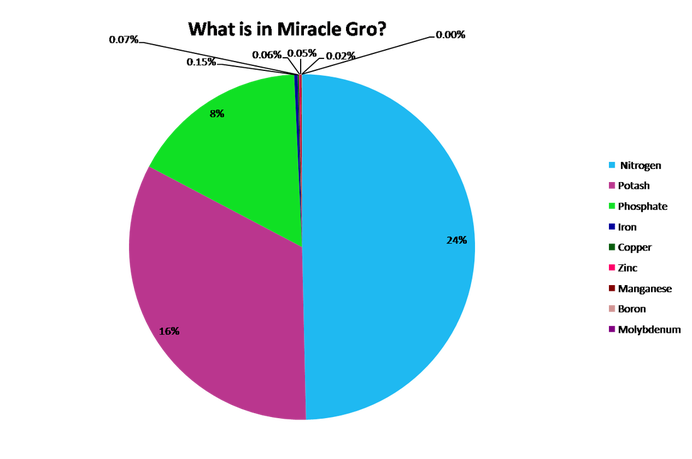Chemical and Organic Fertilizers
by K

Chemical fertilizers may work great on your plants, but they are a big problem for the earth. The purpose of chemical fertilizers is to mimic nutrients found in plants. There are bad and good things about chemical fertilizers. Some of the good things are that you can have a beautiful yard, and chemical fertilizers have balanced amounted of potassium, nitrogen and phosphorus. If you choose the right type of fertilizer, chemical fertilizers will most likely work. There are some bad things about chemical fertilizers. First, the chemical fertilizers can wash into your groundwater and harm you. Second, some can be very acidic, which can be more expensive than organic fertilizers; some organic fertilizers are free. Chemical fertilizers can also lead to chemical imbalance in the ecosystem. So, chemical fertilizers can work great for your lawn and plants, but they can be bad for the earth.
Miracle-Gro® is a commonly used chemical fertilizer. Miracle-Gro® contains 24 percent Nitrogen, 16 percent Potash, 8 percent Phosphate, 0.15 percent Iron, 0.07 percent Copper, 0.06 percent Zinc, 0.05 percent Manganese, 0.02 percent Boron and 0.0005 percent Molybdenum. Miracle-Gro® can give you great big, healthy plants and bigger harvests. Farmers or gardeners use it to keep plants from drying out and help them build strong roots. Miracle-Gro® is a chemical fertilizer, so it is harmful to the earth because it can wash into water sources. It can also damage animals and humans if they eat it because it made up of chemicals. Miracle-Gro® is great for the plants, but it is not healthy for the earth or your body.
Organic fertilizers are made of natural ingredients like plants, animals, and minerals. Organic fertilizers have no chemicals in them, so they do not harm the earth. Organic fertilizer releases nutrients over time, not all at once. Some organic fertilizers are manure, slurry, worm castings, peat, humic acid, guano, bloodmeal, bone meal, amino acid, seaweed, seaweed extracts, sewage sledge, fish meal and compost. There are good and bad things about organic fertilizers as well. First, organic fertilizers don’t harm the earth. Secondly, organic fertilizers reduce the risk of over fertilization. Thirdly, organic fertilizers help prevent erosion. Finally, if organic fertilizers wash in bodies of water they don’t harm animals as much. There are also bad things about organic fertilizers. Organic fertilizers can more expensive and complicated. Secondly, some organic fertilizers have things from plants or animals that are harmful to plants, animals, and people. Thirdly, there is more labor contained in organic fertilizers than chemical fertilizers. Overall, organic fertilizers are pretty good, especially if you make them yourself.
Manure is a great organic fertilizer. Manure contains balanced amounts nitrogen, phosphorous, potassium. Manure is not only great for the earth, but it costs less and even more less if you have animals. Also, manure can hold a lot of water and release it over time. Overall, manure improves the plant’s heath and improves soil structure. There are some negative things about using fresh manure. Fresh manure can have high levels of nitrogen, which can burn the plants. Also, manure can be limited in supply. In conclusion, manure is pretty good for the soil because it is natural and doesn’t harm the earth.
Miracle-Gro® is a commonly used chemical fertilizer. Miracle-Gro® contains 24 percent Nitrogen, 16 percent Potash, 8 percent Phosphate, 0.15 percent Iron, 0.07 percent Copper, 0.06 percent Zinc, 0.05 percent Manganese, 0.02 percent Boron and 0.0005 percent Molybdenum. Miracle-Gro® can give you great big, healthy plants and bigger harvests. Farmers or gardeners use it to keep plants from drying out and help them build strong roots. Miracle-Gro® is a chemical fertilizer, so it is harmful to the earth because it can wash into water sources. It can also damage animals and humans if they eat it because it made up of chemicals. Miracle-Gro® is great for the plants, but it is not healthy for the earth or your body.
Organic fertilizers are made of natural ingredients like plants, animals, and minerals. Organic fertilizers have no chemicals in them, so they do not harm the earth. Organic fertilizer releases nutrients over time, not all at once. Some organic fertilizers are manure, slurry, worm castings, peat, humic acid, guano, bloodmeal, bone meal, amino acid, seaweed, seaweed extracts, sewage sledge, fish meal and compost. There are good and bad things about organic fertilizers as well. First, organic fertilizers don’t harm the earth. Secondly, organic fertilizers reduce the risk of over fertilization. Thirdly, organic fertilizers help prevent erosion. Finally, if organic fertilizers wash in bodies of water they don’t harm animals as much. There are also bad things about organic fertilizers. Organic fertilizers can more expensive and complicated. Secondly, some organic fertilizers have things from plants or animals that are harmful to plants, animals, and people. Thirdly, there is more labor contained in organic fertilizers than chemical fertilizers. Overall, organic fertilizers are pretty good, especially if you make them yourself.
Manure is a great organic fertilizer. Manure contains balanced amounts nitrogen, phosphorous, potassium. Manure is not only great for the earth, but it costs less and even more less if you have animals. Also, manure can hold a lot of water and release it over time. Overall, manure improves the plant’s heath and improves soil structure. There are some negative things about using fresh manure. Fresh manure can have high levels of nitrogen, which can burn the plants. Also, manure can be limited in supply. In conclusion, manure is pretty good for the soil because it is natural and doesn’t harm the earth.

